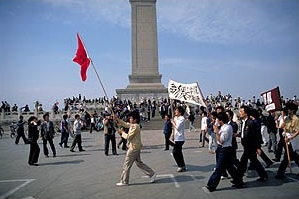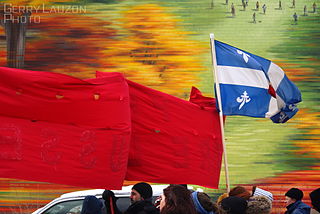Related Research Articles

The Tiananmen Square protests, known in China as the June Fourth Incident, were student-led demonstrations held in Tiananmen Square, Beijing, China, lasting from 15 April to 4 June 1989. After weeks of unsuccessful attempts between the demonstrators and the Chinese government to find a peaceful resolution, the Chinese government declared martial law on the night of 3 June and deployed troops to occupy the square in what is referred to as the Tiananmen Square massacre. The events are sometimes called the '89 Democracy Movement, the Tiananmen Square Incident, or the Tiananmen uprising.

The Russian Revolution of 1905, also known as the First Russian Revolution, began on 22 January 1905. A wave of mass political and social unrest then began to spread across the vast areas of the Russian Empire. The unrest was directed primarily against the Tsar, the nobility, and the ruling class. It included worker strikes, peasant unrest, and military mutinies. In response to the public pressure, Tsar Nicholas II was forced to go back on his earlier authoritarian stance and enact some reform. This took the form of establishing the State Duma, the multi-party system, and the Russian Constitution of 1906. Despite popular participation in the Duma, the parliament was unable to issue laws of its own, and frequently came into conflict with Nicholas. The Duma's power was limited and Nicholas continued to hold the ruling authority. Furthermore, he could dissolve the Duma, which he did three times in order to get rid of the opposition.

The Velvet Revolution or Gentle Revolution was a non-violent transition of power in what was then Czechoslovakia, occurring from 17 November to 28 November 1989. Popular demonstrations against the one-party government of the Communist Party of Czechoslovakia included students and older dissidents. The result was the end of 41 years of one-party rule in Czechoslovakia, and the subsequent dismantling of the command economy and conversion to a parliamentary republic.

Student activism or campus activism is work by students to cause political, environmental, economic, or social change. In addition to education, student groups often play central roles in democratization and winning civil rights.

Chicago Public Schools (CPS), officially classified as City of Chicago School District #299 for funding and districting reasons, in Chicago, Illinois, is the fourth-largest school district in the United States, after New York, Los Angeles, and Miami-Dade County. For the 2020–21 school year, CPS reported overseeing 638 schools, including 476 elementary schools and 162 high schools; of which 513 were district-run, 115 were charter schools, 9 were contract schools and 1 was a SAFE school. The district serves 340,658 students. Chicago Public School students attend a particular school based on their area of residence, except for charter, magnet, and selective enrollment schools.

The protests of 1968 comprised a worldwide escalation of social conflicts, which were predominantly characterized by the rise of left-wing politics, anti-war sentiment, civil rights urgency, youth counterculture within the silent and baby boomer generations, and popular rebellions against state militaries and bureaucracies.

The 2006 youth protests in France occurred during the months of February, March, and April as a result of opposition to a measure set to deregulate labour. Young people were the primary participants in the protests as the bill would have directly affected their future jobs in a way that they considered negative.

As an act of protest, occupation is a strategy often used by social movements and other forms of collective social action in order to squat and hold public and symbolic spaces, buildings, critical infrastructure such as entrances to train stations, shopping centers, university buildings, squares, and parks. Opposed to a military occupation which attempts to subdue a conquered country, a protest occupation is a means to resist the status quo and advocate a change in public policy. Occupation attempts to use space as an instrument in order to achieve political and economic change, and to construct counter-spaces in which protesters express their desire to participate in the production and re-imagination of urban space. Often, this is connected to the right to the city, which is the right to inhabit and be in the city as well as to redefine the city in ways that challenge the demands of capitalist accumulation. That is to make public spaces more valuable to the citizens in contrast to favoring the interests of corporate and financial capital.

The 2010 pension reform strikes in France were a series of general strikes and demonstrations which occurred in France throughout September and October 2010.

The Jordanian protests were a series of protests in Jordan that began in January 2011, and resulted in the firing of the cabinet ministers of the government. In its early phase, protests in Jordan were initially against unemployment, inflation, corruption. along with demanding for real constitutional monarchy and electoral reforms.

The 2011 Armenian protests were a series of civil demonstrations aimed at provoking political reforms and concessions from both the government of Armenia and the civic government of Yerevan, its capital and largest city. Protesters demanded President Serzh Sargsyan release political prisoners, prosecute those responsible for the deaths of opposition activists after the 2008 presidential election and institute democratic and socioeconomic reforms, including the right to organise in Freedom Square in downtown Yerevan. They also protested against Yerevan Mayor Karen Karapetyan for banning the opposition from Freedom Square and barring vendors and traders from the city streets. The opposition bloc Armenian National Congress, which has played a major role in organising and leading the demonstrations, had also called for a snap election and the resignation of the government.

The 2011–2013 Chilean protests – known as the Chilean Winter or the Chilean Education Conflict – were a series of student-led protests across Chile, demanding a new framework for education in the country, including more direct state participation in secondary education and an end to the existence of profit in higher education. Currently in Chile, only 45% of high school students study in traditional public schools and most universities are also private. No new public universities have been built since the end of the Chilean transition to democracy in 1990, even though the number of university students has increased.

The 2012 Quebec student protests (movement) were a series of student protests led by students individually such as the Association pour une solidarité syndicale étudiante (ASSÉ), the Fédération étudiante universitaire du Québec, and the Fédération étudiante collégiale du Québec against a proposal by the Quebec Cabinet, headed by Liberal Premier Jean Charest, to raise university tuition from $2,168 to $3,793 between 2012 and 2018. As part of the protest movement, a series of widespread student strikes were organized, involving half of Quebec's student population by April 2012. A third of Québécois students continued to participate in the strike by its 100th day, while a quarter million had participated during its peak. Other students continued to attend their courses.

Bill 78, officially titled An Act to enable students to receive instruction from the postsecondary institutions they attend, led to an emergency law passed on 18 May 2012 by the National Assembly of Quebec. The law was passed in response to a student strike opposing tuition increases, associated with large student protests, and states that its purpose is to ensure that no student be denied the right to receive education at the school they attend, and that no one may impede the school's ability to provide it. The law restricts protest or picketing on or near university grounds. The law further requires that organizers of a protest, consisting of 50 or more people in a public venue anywhere in Quebec, submit their proposed venue and/or route to the relevant police for approval. Bill 78 was drafted by members of the Quebec Liberal Party, introduced by Education Minister Michelle Courchesne, and passed with the support of the Coalition Avenir Québec party. The planned tuition increases were subsequently repealed in September 2012, by a decree from Pauline Marois's newly elected Parti Québécois government.

The September 2019 climate strikes, also known as the Global Week for Future, were a series of international strikes and protests to demand action be taken to address climate change, which took place from 20 to 27 September 2019. The strikes' key dates were 20 September, which was three days before the United Nations Climate Summit, and 27 September. The protests took place across 4,500 locations in 150 countries. The event stemmed from the Fridays for Future school strike for climate movement, inspired by Swedish climate activist Greta Thunberg. The Guardian reported that roughly 6 million people participated in the events, whilst 350.org – a group that organised many of the protests – claim that 7.6 million people participated.
The League of Filipino Students is a student-led national democratic mass organization and movement organized during the martial law era in the Philippines on September 11, 1977. It claims to be the leading anti-imperialist organization of the Filipino youth, under the ideological line of national democracy. It is part of the broader movement known as Bagong Alyansang Makabayan.
The 2003 Iranian student protests was a series of nationwide rallies and student protests in Iran against president Mohammad Khatami and demanded more liberal democratic reforms and justice over the deaths in the Iran student protests, July 1999.

The Quebec protests of 2015–2016 is a protest movement that began on March 21, 2015 in Quebec, in the context of what some student associations, left-wing groups, columnists qualify as social strikes, to denounce the budget restriction measures adopted by the Philippe Couillard government. 130,000 students are on strike during the first national demonstration on April 2, 2015, including 55,000 on general strike. Like the 2012 Quebec student protests, the movement was initiated by students and encompassed various issues, particularly that of public finances.
The 2021-2022 Iranian protests erupted on 15 July 2021 to protest the water shortages and crisis, but were quickly met with police violence and brutality. "Bloody Aban", November 2021 saw further protests due to water shortages but various other protests and strikes also took place due to the worsening economic situation. In August 2021, Amnesty International noted that brutal forces have been used by the Security Forces to oppress the protesters.
References
- ↑ "Government suspends university grants after protest action". UniversityWorldNews. 20 April 2019.
- ↑ "Gabonese students take to streets to demand scholarships". AfricaNews. 11 April 2019.